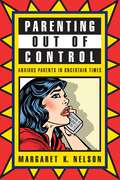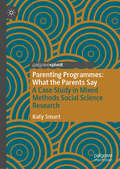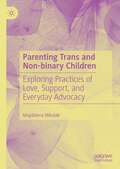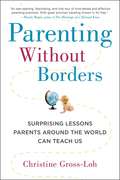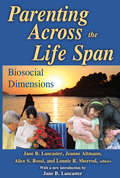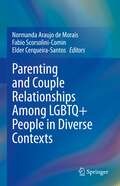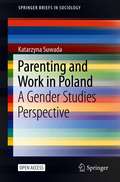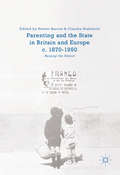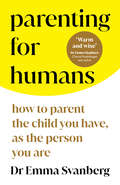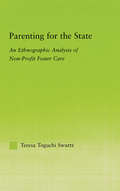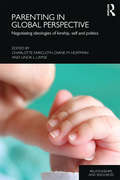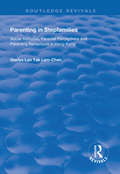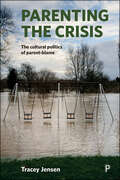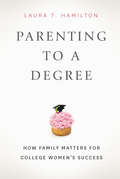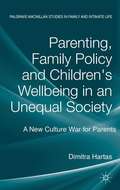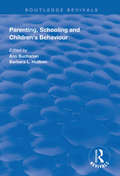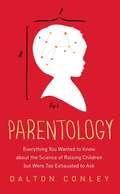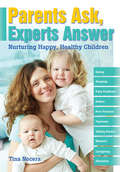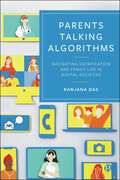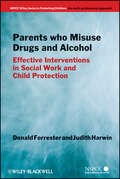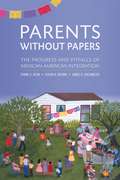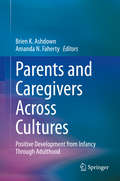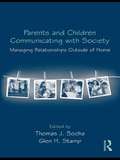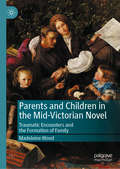- Table View
- List View
Parenting Out of Control: Anxious Parents in Uncertain Times
by Margaret K. NelsonThey go by many names: helicopter parents, hovercrafts, PFHs (Parents from Hell). The news media is filled with stories of well-intentioned parents going to ridiculous extremes to remove all obstacles from their child’s path to greatness . . . or at least to an ivy league school. From cradle to college, they remain intimately enmeshed in their children’s lives, stifling their development and creating infantilized, spoiled, immature adults unprepared to make the decisions necessary for the real world. Or so the story goes.Drawing on a wealth of eye-opening interviews with parents across the country, Margaret K. Nelson cuts through the stereotypes and hyperbole to examine the realities of what she terms “parenting out of control.” Situating this phenomenon within a broad sociological context, she finds several striking explanations for why today’s prosperous and well-educated parents are unable to set realistic boundaries when it comes to raising their children. Analyzing the goals and aspirations parents have for their children as well as the strategies they use to reach them, Nelson discovers fundamental differences among American parenting styles that expose class fault lines, both within the elite and between the elite and the middle and working classes.Nelson goes on to explore the new ways technology shapes modern parenting. From baby monitors to cell phones (often referred to as the world’s longest umbilical cord), to social networking sites, and even GPS devices, parents have more tools at their disposal than ever before to communicate with, supervise, and even spy on their children. These play important and often surprising roles in the phenomenon of parenting out of control. Yet the technologies parents choose, and those they refuse to use, often seem counterintuitive. Nelson shows that these choices make sense when viewed in the light of class expectations.Today’s parents are faced with unprecedented opportunities and dangers for their children, and are evolving novel strategies to adapt to these changes. Nelson’s lucid and insightful work provides an authoritative examination of what happens when these new strategies go too far.
Parenting Programmes: A Case Study in Mixed Methods Social Science Research
by Katy SmartThis book presents original research examining parents’ perspectives on the structure, content and delivery of parenting programmes. It explores how parents have personally been impacted by attending such a programme and finally whether or not this might be affecting their child. Utilising an innovative mixed methods research approach, based around a critical realist philosophy, the author follows 136 families through one of three parenting programmes and beyond. In doing so, she provides important new insights regarding the efficacy of the parenting programmes, demonstrating a real-world application of the transplant model of parent-professional practice in action.This book provides a valuable new resource for students and scholars working in the psychology of education, education, childhood studies, and across the social sciences more broadly. It will also be of interest to policymakers and professionals involved in the development and implementation of parenting programmes.
Parenting Trans and Non-binary Children: Exploring Practices of Love, Support, and Everyday Advocacy
by Magdalena MikulakBased on interviews conducted with parents of trans and gender diverse children in the UK, this book presents an account and analysis of the love, support, and advocacy involved in parenting trans and gender diverse children. Mikulak explores how parents negotiate and challenge cis-normativity to make familial, educational, and healthcare settings livable for their trans and gender diverse children. By examining the educational and emotional labor that parents perform as they advocate for their children across these different settings, the book highlights the value of parental expertise and labor while calling out the systemic failures that continue to make this work necessary. This research will be of interest to scholars researching family studies, kinship studies, gender studies, and queer studies.
Parenting Without Borders: Surprising Lessons Parents Around the World Can Teach Us
by Christine Gross-LohAn eye-opening guide to the world's best parenting strategiesResearch reveals that American kids lag behind in academic achievement, happiness, and wellness.<P><P> Christine Gross-Loh exposes culturally determined norms we have about "good parenting," and asks, Are there parenting strategies other countries are getting right that we are not? This book takes us across the globe and examines how parents successfully foster resilience, creativity, independence, and academic excellence in their children. Illuminating the surprising ways in which culture shapes our parenting practices, Gross-Loh offers objective, research-based insight such as:Co-sleeping may promote independence in kids."Hoverparenting" can damage a child's resilience.Finnish children, who rank among the highest academic achievers, enjoy multiple recesses a day.Our obsession with self-esteem may limit a child's potential.est for children and why. Among her eye-opening findings: Co-sleeping, typical in most of the world's families, may promote independence in kids. American-style "hoverparenting" is unique in the world and can damage a child's resilience. Finnish children, who rank among the world's highest academic achievers, enjoy multiple recesses a day. Our obsession with self-esteem--a concept that doesn't exist in many countries--may limit a child's potential At last bringing empirical research to the debate, Parenting Without Borders offers new and provocative thinking on the secrets to raising a confident and capable generation.
Parenting across the Life Span: Biosocial Dimensions (Foundations Of Human Behavior Ser.)
by Jeanne AltmannResearch on parenting through the life course has developed around two separate approaches. Evolutionary biology provides fresh perspectives from life history theory using behavioral ecology and parental investment theory. At the same time, the social and behavioral sciences integrates research from long-term studies of individual development and from the collection of life histories.This path-breaking book advances evolutionary, life history research by integrating perspectives of these two approaches into a biosocial science of the life course. It examines parenthood as a commitment extending throughout life and focuses on the impact on parental and child behavior of changes in the timing, distribution, and intensity of parental investment. This perspective is particularly appropriate for research on parenting since the family is the universal human institution within which the bearing and rearing of children has been based and which transmits traditions, beliefs, and values to the young.
Parenting and Couple Relationships Among LGBTQ+ People in Diverse Contexts
by Normanda Araujo de Morais Fabio Scorsolini-Comin Elder Cerqueira-SantosThis book analyzes how the increasing number of same-sex couples is changing the traditional concepts of family and parenthood, and how these changes affect the psychological studies of family, couple relationships and human development. The majority of chapters included in this contributed volume present results of research conducted with LGBTQ+ people in Brazil, a country where same-sex couples have been recognized by the national legislation since 2011, but is currently facing a conservative wave which threatens much of the victories gained by the LGBTQ+ movement in recent years. That’s why this book aims to provide both updated theoretical and methodological contributions as well as ethically and political engaged reflections to the field of psychological studies of LGBTQ+ parenting and couple relationships. Chapters in this volume analyze different aspects of LGBTQ+ parenting and couple relationships, such as changes in the concept of family; the role of the family of origin in the coming out process of young adults; risk and protective factors in couple relationships between lesbians and gay men; vulnerabilities experienced by trans couples during the COVID-19 pandemic; how lesbians, gays, trans and non-binaries are approaching parenting and raising their families; factors that shape the reproductive decisions of LGBTQ+ individuals; adoption and coparenting in families composed of gay and lesbian couples, among other topics. Parenting and Couple Relationships Among LGBTQ+ People in Diverse Contexts will be of interest to social, developmental and family psychologists and social workers researching and working with same-sex couples and families, and with the LGBTQ+ population in general.
Parenting and Work in Poland: A Gender Studies Perspective (SpringerBriefs in Sociology)
by Katarzyna SuwadaThe open access book provides a critical account of parenthood in Polish society. It uses a qualitative perspective to show how mothers and fathers engage with parenthood and also function in the labour market. Parenting in contemporary Poland is not only affected by individual preferences and choices, but significantly by the institutional context, in particular the family policy system, as well as socio-cultural norms of how men and women should fulfill parental roles. The author distinguishes between different kinds of work done in connection to parenthood and shows how the existing institutional system reinforces gender and other forms of social inequalities even in a post-communist state like Poland. The author demonstrates that Polish society has different expectations and institutional norms related to work and gender norms compared to those in long-standing democracies in Europe and elsewhere. The book also shows that the experiences of parenthood in Poland are different between men and women, between single and coupled parents, and based on economic and other resources. This book is of interest to social science students and researchers of family studies, parenting, sociology of work, and social structure in post-communist societies.
Parenting and the State in Britain and Europe, c. 1870-1950
by Hester Barron Claudia SiebrechtThis innovative collection draws on original research to explore the dynamic interactions between parents, governments and their representatives across a range of European contexts; from democratic Britain and Finland, to Stalinist Russia and Fascist Italy. The authors pay close attention to the various relationships and dynamics between parents and the state, showing that the different parties were defined not solely by coercion or manipulation, but also by collaboration and negotiation. Parents were not passive recipients of government direction: rituals and cultures of parenting could both affirm and undermine state politics. Readers will find this collection crucial to understanding family life and the role of the state during a period when both underwent significant change.
Parenting for Humans: How to Parent the Child You Have, As the Person You Are
by Dr. Emma Svanberg"You will learn why you parent the way you do, how to grow into your own parenting role, and ultimately, how to parent the unique child you have." —Dr. Becky Kennedy, clinical psychologist, #1 New York Times bestselling author of Good InsideThis is not a parenting book (it's a book for parents), exploring what we bring to the parenting journey and how we can gain confidence in ourselves not just as parents, but as whole human beings.There's always that moment as a parent when you feel like no matter how hard you're trying, you just can't get it "right." But the fact is, parenting is hard and once we know this and why, we can forgive ourselves for finding it a struggle, and start to look for the things that make parenting a joy.As well as learning to parent ourselves, it will show us how to parent the child we actually have, not a textbook version, but our complicated, messy child with their own powerful needs. And by tuning into their language, learning how to hold them, not mold them, we can really start enjoying them for the funny and unique human beings that they are.With the right support and guidance, we can all totally do this parenting thing and grow a positive and loving relationship that will last forever.
Parenting for the State: An Ethnographic Analysis of Non-Profit Foster Care (New Approaches In Sociology Ser.)
by Teresa Toguchi SwartzThrough careful ethnography and rich in-depth interviews at a non-profit foster family agency, this book takes a look behind the scenes of our troubled foster care system.
Parenting in Global Perspective: Negotiating Ideologies of Kinship, Self and Politics (Relationships and Resources)
by Charlotte Faircloth Linda L. Layne Diane M. HoffmanDrawing on both sociological and anthropological perspectives, this volume explores cross-national trends and everyday experiences of ‘parenting’. Parenting in Global Perspective examines the significance of ‘parenting’ as a subject of professional expertise, and activity in which adults are increasingly expected to be emotionally absorbed and become personally fulfilled. By focusing the significance of parenting as a form of relationship and as mediated by family relationships across time and space, the book explores the points of accommodation and points of tension between parenting as defined by professionals, and those experienced by parents themselves. Specific themes include: the ways in which the moral context for parenting is negotiated and sustained the structural constraints to ‘good’ parenting (particularly in cases of immigration or reproductive technologies) the relationship between intimate family life and broader cultural trends, parenting culture, policy making and nationhood parenting and/as adult ‘identity-work’. Including contributions on parenting from a range of ethnographic locales – from Europe, Canada and the US, to non-Euro-American settings such as Turkey, Chile and Brazil, this volume presents a uniquely critical and international perspective, which positions parenting as a global ideology that intersects in a variety of ways with the political, social, cultural, and economic positions of parents and families.
Parenting in Stepfamilies: Social Attitudes, Parental Perceptions and Parenting Behaviours in Hong Kong (Routledge Revivals)
by Gladys Lan Lam-ChanFirst published in 1999, this book contains the findings of an exploratory study using in-depth interviews on parenting and the dynamics of Hong Kong Chinese stepfamilies. The stepfamily is a topic which is in lack of local research in Hong Kong, but is an emerging family structure which has increasing need for professional intervention. This study began as a result of the researcher’s concern about the soaring number of divorces and broken families in Hong Kong and her curiosity to uncover the untold stories of stepfamilies. The literature review, presentation and thematic analysis of the findings of this study will increase the readers knowledge and understanding of stepfamilies in contexts which are different from Western societies. This book unveils the perceptions and life experiences of the stepmothers, social workers and teachers attitudes towards stepfamilies and the parenting behaviours of stepfamilies in Hong Kong. The author has reflectively analyzed the complex interplay between the social attitudes, cultural stereotyping of stepfamilies influenced by Chinese traditional values, aspirations towards marriage and marital relationships, parental expectations and parent-child relationships, ideology and policy issues affecting professional intervention.
Parenting the Crisis: The Cultural Politics of Parent-Blame
by Tracey JensenBad parenting is so often blamed for Britain’s ‘broken society’, manifesting in sites as diverse as the government reaction to the riots of 2011, popular ‘entertainment’ like Supernanny and the discussion boards of Mumsnet. This book examines how these pathologising ideas of failing, chaotic and dysfunctional families are manufactured across media, policy and public debate and how they create a powerful consensus that Britain is in the grip of a ‘parent crisis’. It tracks how crisis talk around parenting has been used to police and discipline families who are considered to be morally deficient and socially irresponsible. Most damagingly, it has been used to justify increasingly punitive state policies towards families in the name of making ‘bad parents’ more responsible. Is the real crisis in our perceptions rather than reality? This is essential reading for anyone engaged in policy and popular debate around parenting.
Parenting to a Degree: How Family Matters for College Women's Success
by Laura T. HamiltonHelicopter parents--the kind that continue to hover even in college--are one of the most ridiculed figures of twenty-first-century parenting, criticized for creating entitled young adults who boomerang back home. But do involved parents really damage their children and burden universities? In this book, sociologist Laura T. Hamilton illuminates the lives of young women and their families to ask just what role parents play during the crucial college years. Hamilton vividly captures the parenting approaches of mothers and fathers from all walks of life--from a CFO for a Fortune 500 company to a waitress at a roadside diner. As she shows, parents are guided by different visions of the ideal college experience, built around classed notions of women's work/family plans and the ideal age to "grow up." Some are intensively involved and hold adulthood at bay to cultivate specific traits: professional helicopters, for instance, help develop the skills and credentials that will advance their daughters' careers, while pink helicopters emphasize appearance, charm, and social ties in the hopes that women will secure a wealthy mate. In sharp contrast, bystander parents--whose influence is often limited by economic concerns--are relegated to the sidelines of their daughter's lives. Finally, paramedic parents--who can come from a wide range of class backgrounds--sit in the middle, intervening in emergencies but otherwise valuing self-sufficiency above all. Analyzing the effects of each of these approaches with clarity and depth, Hamilton ultimately argues that successfully navigating many colleges and universities without involved parents is nearly impossible, and that schools themselves are increasingly dependent on active parents for a wide array of tasks, with intended and unintended consequences. Altogether, Parenting to a Degree offers an incisive look into the new--and sometimes problematic--relationship between students, parents, and universities.
Parenting, Family Policy and Children�s Well-Being in an Unequal Society
by Dimitra HartasThis book examines parenting in an unequal society and questions whether it is a key mechanism through which poverty translates into underachievement and reduced life chances in children.
Parenting, Schooling and Children's Behaviour (Routledge Revivals)
by Ann Buchanan Barbara L. HudsonPublished in 1998, this book brings together some of the key findings in parenting and educational programmes from researchers at the University of Oxford, working in primary health care, educational studies, clinical psychology and applied social studies. At a time of considerable changes in family life and society in general, there is concern that some children are not achieving their potential because of emotional and behavioural difficulties. This book looks across the health, education and social divide and highlights what we know and what we don't know about effective strategies in helping children and their parents overcome their difficulties. Each chapter is written by a different member of the centre at Oxford for Research into Parenting and Children and is based on their research.
Parentology: Everything You Wanted to Know about the Science of Raising Children but Were Too Exhausted to Ask
by Dalton ConleyAn award-winning scientist offers his unorthodox approach to childrearing: “Parentology is brilliant, jaw-droppingly funny, and full of wisdom…bound to change your thinking about parenting and its conventions” (Amy Chua, author of Battle Hymn of the Tiger Mother).If you’re like many parents, you might ask family and friends for advice when faced with important choices about how to raise your kids. You might turn to parenting books or simply rely on timeworn religious or cultural traditions. But when Dalton Conley, a dual-doctorate scientist and full-blown nerd, needed childrearing advice, he turned to scientific research to make the big decisions. In Parentology, Conley hilariously reports the results of those experiments, from bribing his kids to do math (since studies show conditional cash transfers improved educational and health outcomes for kids) to teaching them impulse control by giving them weird names (because evidence shows kids with unique names learn not to react when their peers tease them) to getting a vasectomy (because fewer kids in a family mean smarter kids). Conley encourages parents to draw on the latest data to rear children, if only because that level of engagement with kids will produce solid and happy ones. Ultimately these experiments are very loving, and the outcomes are redemptive—even when Conley’s sassy kids show him the limits of his profession. Parentology teaches you everything you need to know about the latest literature on parenting—with lessons that go down easy. You’ll be laughing and learning at the same time.
Parents Ask, Experts Answer: Nurturing Happy, Healthy Children
by Tina NoceraParents often assume that other parents have it all figured out, that other parents have all the answers. But, all parents face complex problems that cannot be solved with a one-size-fits all answer. Tina Nocera, founder of Parental Wisdom and author of Parents Ask, Experts Answer, believes that a parent knows his own child best and is the expert on that child. In Parents Ask, Experts Answer, Nocera brings together a panel of thirty-five child-development experts to offer advice on some of the most challenging issues that parents face. By presenting multiple solutions to each issue, parents are empowered to choose a realistic solution that is right for their family.
Parents Talking Algorithms: Navigating Datafication and Family Life in Digital Societies
by Ranjana DasIn today's digital societies, parenting is shaped by algorithms daily - in search engines, social media, kids' entertainment, the news and more. But how much are parents aware of the algorithms shaping their parenting and daily lives? How can they prepare for children’s futures in a world dominated by data, algorithms, automation and AI? This groundbreaking study of 30 English families sheds light on parents’ hopes and fears, their experiences with algorithms in searching, sharing and consuming news and information, and their awareness and knowledge of algorithms at large. Looking beyond tech skills and media panics, this book is an essential read for social scientists, policy makers and general readers seeking to understand parenting in datafied societies.
Parents Who Cheat: How Children and Adults Are Affected When Their Parents Are Unfaithful
by Dr. Ana NogalesNationally known psychologist Ana Ledwin Nogales addresses the affects of parental infidelity on childhood development—and on these children's relationships as adults Many books explore the affects of marital infidelity on a marriage, but Parents Who Cheat is the first book to examine not only how this behavior contributes to the breakdown of a family structure but how it directly affects the children in that family. With compassion and piercing insight, Dr. Ana Ledwin Nogales explains how adultery damages a child's understanding of love, marriage, and trust. As these children grow toward adulthood, their ability to have healthy relationships is compromised. Through stories of children struggling to understand their parents' adultery, as well as case histories of adult children coping with unresolved issues related to parental infidelity, Dr. Nogales shows how destructive habits are formed and points the way toward healing and the creation of healthier relationships with parents and partners.
Parents Who Misuse Drugs and Alcohol
by Donald Forrester Judith HarwinThis book presents original research outlining the key elements in responding to parental misuse of drugs and alcohol.Offers a definition of "misuse" and "addiction" and the factors that influence the nature of misuse or addictionReviews extensively the nature and impact of parental substance misuse on children and families using the latest evidenceExplores how research and theories might help inform professionals or non-professionals assessing families affected by parents who misuse drugs or alcoholProvides an in-depth discussion of Motivational Interviewing, including a critical discussion of the challenges and limitations involved in using it in child and family settingsConsiders the wider implications of the findings for practice and policy and argues that these responses can be used across the field of work with vulnerable children and their families
Parents Without Papers: The Progress and Pitfalls of Mexican American Integration
by Frank D. Bean James D. Bachmeier Susan K. BrownFor several decades, Mexican immigrants in the United States have outnumbered those from any other country. Though the economy increasingly needs their labor, many remain unauthorized. In Parents Without Papers, immigration scholars Frank D. Bean, Susan K. Brown, and James D. Bachmeier document the extent to which the outsider status of these newcomers inflicts multiple hardships on their children and grandchildren. Parents Without Papers provides both a general conceptualization of immigrant integration and an in-depth examination of the Mexican American case. The authors draw upon unique retrospective data to shed light on three generations of integration. They show in particular that the “membership exclusion” experienced by unauthorized Mexican immigrants—that is, their fear of deportation, lack of civil rights, and poor access to good jobs—hinders the education of their children, even those who are U.S.-born. Moreover, they find that children are hampered not by the unauthorized entry of parents itself but rather by the long-term inability of parents, especially mothers, to acquire green cards. When unauthorized parents attain legal status, the disadvantages of the second generation begin to disappear. These second-generation men and women achieve schooling on par with those whose parents come legally. By the third generation, socioeconomic levels for women equal or surpass those of native white women. But men reach parity only through greater labor-force participation and longer working hours, results consistent with the idea that their integration is delayed by working-class imperatives to support their families rather than attend college. An innovative analysis of the transmission of advantage and disadvantage among Mexican Americans, Parents Without Papers presents a powerful case for immigration policy reforms that provide not only realistic levels of legal less-skilled migration but also attainable pathways to legalization. Such measures, combined with affordable access to college, are more important than ever for the integration of vulnerable Mexican immigrants and their descendants.
Parents and Caregivers Across Cultures: Positive Development from Infancy Through Adulthood
by Brien K. Ashdown Amanda N. FahertyThis book explores diverse parent-child relationships from around the world, drawing on connections between culture and parenting values and challenges. It identifies parenting practices within various countries’ unique historical, political, and cultural backgrounds, reframing parenting as a cultural process whose goals are to encourage culturally-specific child behaviors and outcomes. Chapters focus on parenting research in a range of countries, such as Australia, Bolivia, China, Egypt, Guatemala, India, Rwanda, Namibia, Saudi Arabia, and the United States. Chapters also discuss social, emotional, and physical developmental topics throughout the lifespan, including infancy, early childhood, adolescence, emerging adulthood, and adulthood. Topics featured in this book include: The link between cultural differences in academic success to parents’ academic socialization practices. The impact of culturally-specific parental engagement in positive developmental outcomes in children. Transgender children and their parents. The relationship between religious and secular values and their influence on creating polygamous teenagers. How to implement a micro-cultural lens to studying parent-child relationships during emerging adulthood. Differences and similarities in grandparenting among different cultures. Parents and Caregivers Across Cultures is a must-have resource for researchers, professors, graduate students as well as clinicians, professionals, and policymakers in the fields of developmental and cross-cultural psychology, parenting and family studies, social work, and related disciplines.
Parents and Children Communicating with Society: Managing Relationships Outside of Home (Routledge Communication Series)
by Thomas J. Socha Glen H. StampThe volume opens a new frontier in parent-child communication research as it brings together veteran researchers and newcomers to explore the communication of parents and children as they create relationships outside the family. The chapters herein examine communication processes and problems of parents and children as they interact with childcare, healthcare, education, and youth sports; investigate the unique challenges facing various types of families as they communicate outside the family (e.g., stepfamilies and gay/lesbian/bisexual families); and consider the role of media in family relationships outside of home.<P><P> The primary audiences for the volume includes scholars, researchers and graduate students studying communication in families, children’s communication, communication in personal relationships, organizational communication, group communication, and health communication. It will also be of interest to psychologists who study families, children, and organizations; sociologists who study families, children, and organizations; education researchers; teachers; coaches; family physicians; and family therapists. graduate students It has the potential for use in courses in family communication, family studies, family sociology, and child development.
Parents and Children in the Mid-Victorian Novel: Traumatic Encounters and the Formation of Family
by Madeleine WoodThis book produces an original argument about the emergence of ‘trauma’ in the nineteenth-century through new readings of Dickens, Emily and Charlotte Bronte, Collins, Gaskell and Elliot. Madeleine Wood argues that the mid-Victorian novels present their protagonists in a state of damage, provoked and defined by the conditions of the mid-century family: the cross-generational relationship is presented as formative and traumatising. By presenting family relationships as decisive for our psychological state as well as our social identity, the Victorian authors pushed beyond the contemporary scientific models available to them. Madeleine Wood analyses the literary and historical conditions of the mid-century period that led to this new literary emphasis, and which paved the way for the emergence of psychoanalysis in Vienna at the fin de siècle. Analysing a series of theoretical texts, Madeleine Wood shows that psychoanalysis shares the mid-Victorian concern with the unequal relationship between adult and child, focusing her reading through Freud’s early writings and Jean Laplanche’s ‘general theory of seduction’.
